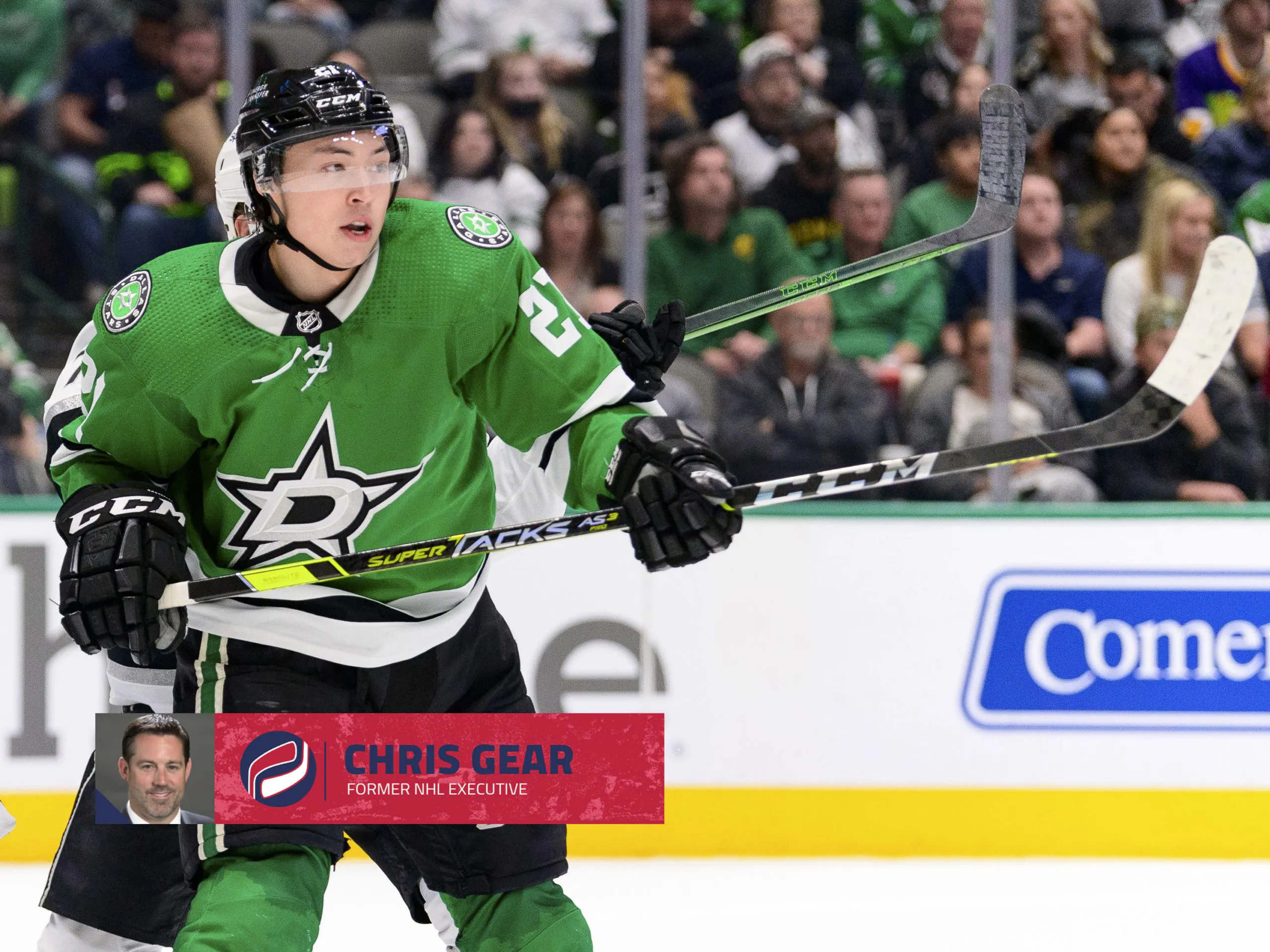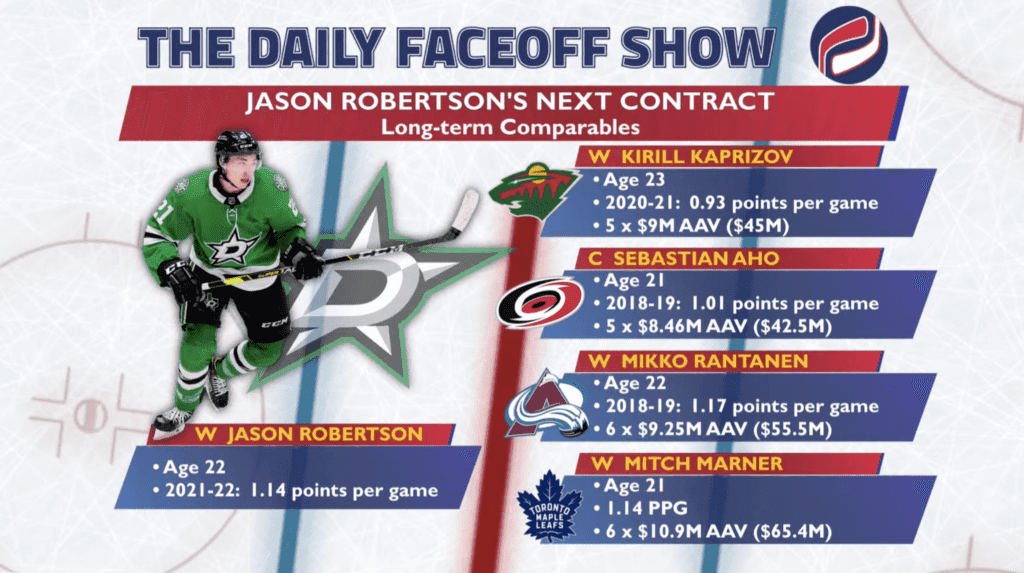Gear: Projecting Jason Robertson’s next contract with the Dallas Stars

Having just spent two days skiing at Northstar Resort in Lake Tahoe, I thought I had enjoyed a pretty good weekend. Turns out that was nothing compared to the weekend left winger Jason Robertson of the Dallas Stars was having.
Robertson turned in a masterful performance, recording the NHL’s first back-to-back hat tricks since Alex Ovechkin accomplished the feat in January 2020. Robertson notched three goals (including the overtime winner) in Friday’s 4-3 win over Winnipeg and then scored three more in a 6-3 romp over Minnesota on Sunday.
Robertson’s six-goal weekend gave him 29 on the season, tied for ninth in the NHL with Edmonton’s Connor McDavid and Calgary’s Andrew Mangiapane. What’s more, Robertson’s third goal in the Stars’ 6-3 win on Sunday marked his 100th career point in just 101 games played.
In case it isn’t obvious, Robertson is on the verge of a very big pay day.
Robertson is 22 years old and in the final year of his entry-level contract. He is a restricted free agent without arbitration rights, but he will nonetheless hold all the cards in the upcoming negotiation with the Stars.
The Stars are a team with an aging core. Forwards Jamie Benn, Tyler Seguin, Joe Pavelski and Alexander Radulov are all now in their 30s. The mantle appears to have already been passed to Robertson, who now leads the team in goals and is just five points behind Pavelski in overall team scoring. Robertson and defenseman Miro Heiskanen, also 22, represent the future in Dallas. With Heiskanen inked to a long-term deal already (eight years and $67.6 million, signed in July 2021), it would seem logical that the Stars would look to lock up their young star forward to a deal with some term as well.
So how does the next pact for Robertson shape up?
Looking at other contracts that have been secured by forwards coming out of their entry-level deals, it is clear Robertson’s stats will justify him being in elite company, regardless of term. It will be difficult for Robertson to keep up his current pace of 1.15 points per game for the balance of the 2021-22 season, but if he does, he could finish with around 45 goals and 85 points – and that would be in no more than 74 games, as he’s missed eight. That’s rare production, even considering some of the young talent that has come through the league in recent years.
If the Stars decide to bridge Robertson with a two- or three-year deal, there are three contracts that come to my mind as comparables, all inked in 2019: the Jets’ two-year, $13.5-million deal ($6.75-million AAV) with Patrik Laine, the Blackhawks’ three-year, $19.2-million deal ($6.4-million AAV) with Alex DeBrincat and the Flames’ three-year, $21-million deal ($7-million AAV) with Matthew Tkachuk. I leave aside the 2019 contract of Tampa Bay’s Brayden Point and the 2021 contract of Vancouver’s Elias Pettersson, as those players are centers – always a point of distinction in contract negotiations.
Robertson is on pace to surpass DeBrincat’s 41 goals in 82 games, Tkachuk’s platform season of 77 points in 80 games and Laine’s 120 points in his first 164 NHL games. With the production Robertson has shown and the positive trend line over his three entry-level years, signing him for three years at $7 million per season would be a good deal for Dallas.
If the Stars are prepared to go with a longer term, as they probably should given the leadership role Robertson will play on their team going forward, the comparables have even bigger tickets. One is Kirill Kaprizov, who in September 2021 signed a five-year, $45-million (AAV of $9 million) contract after a 2020-21 season where he produced at a rate of 0.93 points per game. Dallas will argue that the Kaprizov contract was inflated due to Minnesota’s need to guard against the player’s potential retreat to the KHL, but it is still a number the Stars will need to contend with.

Carolina’s Sebastian Aho (the subject of this past weekend’s Larkin Long Read, which you can check out here) signed a similar five-year deal worth $42.3 million (AAV of $8.46 million) after a 2018-19 campaign in which he tallied 83 points in 82 games.
Kaprizov had played just one season in the NHL at the time of signing, and it was the abbreviated 56-game 2020-21 season, so a true comparison requires extrapolating his totals over a full 82-game season. It works out to approximately 40 goals, while Aho had 30 goals in his platform year. Given the premium always placed on goal scoring, Robertson could arguably be positioned above those two players.
How about the six-year, $55.5-million deal (AAV of $9.25 million) Mikko Rantanen signed in 2019? Rantanen scored 87 points in just 74 games in 2018-19, a points-per-game rate of 1.18. Toronto right winger Mitch Marner also signed a six-year deal in 2019 following a campaign in which he had 94 points in 82 games (1.14 points per game). Marner’s $10.9-million AAV will be touted by the Robertson camp as relevant, but it seems to be a deal that has later been viewed as an outlier given Marner’s lower goal totals, so the Rantanen deal is probably one that the parties will find more common ground on viewing as a comparable. Brady Tkachuk’s seven-year, $8.2 million-per-year deal in 2021 also fits into the equation, although Tkachuk’s value isn’t necessarily measured in goals and assists.
A month ago, the Stars might have been able to justify getting Robertson signed to a more modest long-term contract, such as the seven-year, $7.14-million-per-season deal the Jets gave to Kyle Connor or the eight-year deal Clayton Keller got in Arizona at a $7.15-million AAV. However, after the recent dominant run of play by Robertson, his points per game looks like it will vastly exceed what those players brought to the negotiating table. Maybe the Stars can still get something like that accomplished by appealing to Robertson to accept less to help continue building around him. But he should be able to call his shot.
In the final analysis, there are many factors that go into a negotiation that outside parties aren’t always privy to, so I don’t like to peg numbers too rigidly. Based on stats alone, I think it is safe to assume a number between 8.25 million and 9.25 million per year on a five-to-seven-year term.
Regardless, Robertson will take his place among the league’s highest-paid earners. And when he does, count on him enjoying another very good weekend.
____
Chris Gear joined Daily Faceoff in January after a 12-year run with the Vancouver Canucks, most recently as the club’s Assistant General Manager and Chief Legal Officer. Before migrating over to the hockey operations department, where his responsibilities included contract negotiations, CBA compliance, assisting with roster and salary cap management and governance for the AHL franchise, Gear was the Canucks’ vice president and general counsel.
Click here to read Gear’s other Daily Faceoff stories.